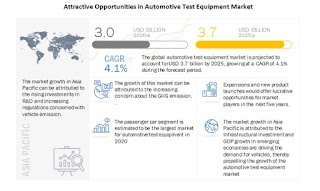Automotive Test Equipment Market – Analysis with Ongoing Trends & Market Revenue
The automotive industry has
witnessed a rapid evolution with continuous developments in engineering and
technology. Technological advancements and the advent of disruptive trends such
as connected, autonomous, and electric vehicles have proliferated the demand
for electronics in vehicles. As a result, the demand for high-level testing is
hugely required for the overall safety of these vehicles. The global Automotive Test Equipment Market size is
expected to show growth at a CAGR of 4.1% from USD 3.0 billion in 2020 to reach
USD 3.7 billion by 2025. Increasing vehicle production and stringent government
regulations pertaining to vehicle testing are anticipated to boost the
automotive test equipment market. Moreover, the major factors driving this
growth are increasing vehicle production and rising electronic architecture in
modern vehicles.
In April 2020, Vector Informatik
GmbH had launched Vector Remote D-PDU API, which is capable of Vehicle
Diagnostics on the Other Side of the World. The Vector Remote D-PDU API enables
geographic separation between the D-PDU API-based application and the vehicle
connected to a PC via VCI. This new product would help to improve the market
growth of the companies/ countries which have better infrastructure and
efficient equipment. This would enable customers in countries with lower
infrastructure to test their vehicles with some of the top equipment that is
available across the globe.
Download PDF Brochure @ https://www.marketsandmarkets.com/pdfdownloadNew.asp?id=195601617
The vehicle emission test system
segment is projected to have the highest growth rate in the automotive test
equipment market, by product type, during the forecast period of 2020-2025.
Various countries across the globe are coming up with stringent regulations
concerned with emission testing, for instance, in India, all new cars are
expected to be issued with pollution certificates which are expected to be
valid for a year, post which, vehicles need to be tested for pollution levels
every six months.
Mobile/ tablet-based equipment is
projected to have the highest growth rate in the automotive test equipment
market, by application, during the forecast period of 2020-2025. Technological
advancements have enabled make mobiles and tablets much smarter and efficient.
The fact that these are much more mobile and data easily accessible enables the
growth of the mobile/tablet-based equipment segment.
OEM R&D/ technical center is
projected to have the highest growth rate in the automotive test equipment
market, by the end market, during the forecast period of 2020-2025. The growth
of this segment is attributed to the fact that the adoption of organic
strategies by OEMs is expanding its reach to its consumers by establishing more
research centers. For instance, in June 2018, Continental AG established its third
R&D center in Singapore, which leverages Singapore’s strong research
capabilities to develop, test, and commercialize mobility solutions to serve
the region’s increasing needs for mobility.
Request Free Sample Report @ https://www.marketsandmarkets.com/requestsampleNew.asp?id=195601617
The passenger car segment is
projected to have the highest growth rate in the automotive test equipment
market, by vehicle, during the forecast period of 2020-2025. The growth of this
segment can be attributed to the increased focus on testing emission levels to
meet stringent norms, as the passenger car segment is expected to be among the
top pollution causing vehicle types.
Asia Pacific is projected to have
the highest growth rate in the automotive test equipment market, by region,
during the forecast period of 2020-2025. The growing automotive production in
India and China is the key driving factor for the growth of the Asia Pacific
market. Besides growing production, high presence of authorized service center
is further driving the market in the region
Key Players
The global automotive test
equipment market is dominated by major players such as ABB (Switzerland),
Robert Bosch GmbH (Germany), Horiba Ltd(Japan), Honeywell (US), Siemens AG
(Germany), and Delphi Technologies (UK).
To speak to our analyst for a
discussion on the above findings, click Speak
to Analyst

Comments
Post a Comment